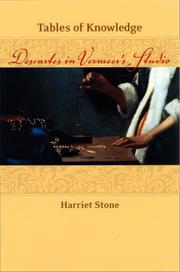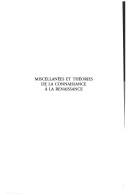| Listing 1 - 10 of 11 | << page >> |
Sort by
|

ISBN: 9780801444616 0801444616 Year: 2006 Publisher: Ithaca ; London Cornell University Press
Abstract | Keywords | Export | Availability | Bookmark
 Loading...
Loading...Choose an application
- Reference Manager
- EndNote
- RefWorks (Direct export to RefWorks)
Vermeer, Johannes --- Descartes, René --- Art and philosophy --- Representation (Philosophy) --- History --- Vermeer, Johannes, --- Descartes, René, --- Criticism and interpretation. --- Influence.
Book
ISBN: 080143212X Year: 1996 Publisher: Ithaca ; London Cornell University Press
Abstract | Keywords | Export | Availability | Bookmark
 Loading...
Loading...Choose an application
- Reference Manager
- EndNote
- RefWorks (Direct export to RefWorks)
Connaissance [Théorie de la ] --- Epistemologie --- Epistemology --- Epistémologie --- Kenleer --- Kennisleer --- Kennistheorie --- Kentheorie --- Knowledge [Theory of ] --- Theorie of knowledge --- Theorievorming --- Théorie de la connaissance --- Classicism --- French literature --- Knowledge, Theory of. --- Literature and science --- History --- History and criticism. --- 17th century --- History and criticism --- France --- Literature and science - France.
Book
Year: 2003 Publisher: Paris Ecole des chartes
Abstract | Keywords | Export | Availability | Bookmark
 Loading...
Loading...Choose an application
- Reference Manager
- EndNote
- RefWorks (Direct export to RefWorks)
Book
ISBN: 9781501738982 Year: 2019 Publisher: Ithaca, NY
Abstract | Keywords | Export | Availability | Bookmark
 Loading...
Loading...Choose an application
- Reference Manager
- EndNote
- RefWorks (Direct export to RefWorks)
Digital
ISBN: 9781487530143 9781487504427 Year: 2019 Publisher: Toronto, Ont. University of Toronto Press
Abstract | Keywords | Export | Availability | Bookmark
 Loading...
Loading...Choose an application
- Reference Manager
- EndNote
- RefWorks (Direct export to RefWorks)
Digital
ISBN: 9781501738982 Year: 2019 Publisher: Ithaca, N.Y. Cornell University Press
Abstract | Keywords | Export | Availability | Bookmark
 Loading...
Loading...Choose an application
- Reference Manager
- EndNote
- RefWorks (Direct export to RefWorks)
Book
Year: 1982 Publisher: Place of publication unknown Brown University
Abstract | Keywords | Export | Availability | Bookmark
 Loading...
Loading...Choose an application
- Reference Manager
- EndNote
- RefWorks (Direct export to RefWorks)
Drama --- Thematology --- Comparative literature --- Corneille, Pierre --- Racine, Jean --- Shakespeare, William
Book
ISBN: 9781487504427 9781487530143 9781487530150 1487530145 1487530153 148750442X Year: 2019 Publisher: Toronto Buffalo London University of Toronto Press
Abstract | Keywords | Export | Availability | Bookmark
 Loading...
Loading...Choose an application
- Reference Manager
- EndNote
- RefWorks (Direct export to RefWorks)
"Crowning Glories integrates Louis XIV's propaganda campaigns, the transmission of Northern art into France, and the rise of empiricism in the eighteenth century--three historical touchstones--to examine what it would have meant for France's elite to experience the arts in France simultaneously with Netherlandish realist painting. In an expansive study of cultural life under the Sun King, Harriet Stone considers the monarchy's elaborate palace decors, the court's official records, and the classical theatre alongside Northern images of daily life in private homes, urban markets, and country fields. Stone argues that Netherlandish art assumes an unobtrusive yet, for the history of ideas, surprisingly dramatic role within the flourishing of the arts, both visual and textual, in France during Louis XIV's reign. Netherlandish realist art represented thinking about knowledge that challenged the monarchy's hold on the French imagination, and its efforts to impose the king's portrait as an ideal and proof of his authority. As objects appreciated for their aesthetic and market value, Northern realist paintings assumed an uncontroversial place in French royal and elite collections. Flemish and Dutch still lifes, genre paintings, and cityscapes, however, were not merely accoutrements of power, acquisitions made by those with influence and money. Crowning Glories reveals how the empirical orientation of Netherlandish realism exposed French court society to a radically different mode of thought, one that would gain full expression in the Encyclopedie of Diderot and d'Alembert."--
Art --- patronage --- influence --- court art --- realism [artistic form of expression] --- Louis XIV [King of France] --- anno 1600-1699 --- anno 1700-1799 --- France --- Art and society --- Arts, French --- Painting, Dutch --- Painting, Flemish --- Realism in art --- Dutch Golden Age --- French --- Louis XIV --- Netherlandish realism --- Northern realism --- Sun King --- century --- classical theatre --- court culture --- cultural production --- cultures --- early modern period --- eighteenth --- epistemology --- history of ideas --- knowledge --- rise of empiricism --- systems --- Realism (Art) --- Idealism in art --- Naturalism in art --- Romanticism in art --- Flemish painting --- Dutch painting --- French arts --- Art and sociology --- Society and art --- Sociology and art --- History --- Influence --- Social aspects --- Louis --- Lodewijk --- le Roi-Soleil --- Louis le Grand --- de Zonnekoning --- Art patronage. --- E-books --- Dutch Golden Age. --- French. --- Louis XIV. --- Netherlandish realism. --- Northern realism. --- Sun King. --- century. --- classical theatre. --- court culture. --- cultural production. --- cultures. --- early modern period. --- eighteenth. --- epistemology. --- history of ideas. --- knowledge. --- rise of empiricism. --- systems. --- HISTORY / Europe / General. --- Influence. --- France. --- Courts and courtiers --- Bro-C'hall --- Fa-kuo --- Fa-lan-hsi --- Faguo --- Falanxi --- Falanxi Gongheguo --- Faransā --- Farānsah --- França --- Francia (Republic) --- Francija --- Francja --- Francland --- Francuska --- Franis --- Franḳraykh --- Frankreich --- Frankrig --- Frankrijk --- Frankrike --- Frankryk --- Fransa --- Fransa Respublikası --- Franse --- Franse Republiek --- Frant︠s︡ --- Frant︠s︡ Uls --- Frant︠s︡ii︠a︡ --- Frantsuzskai︠a︡ Rėspublika --- Frantsyi︠a︡ --- Franza --- French Republic --- Frencisc Cynewīse --- Frenska republika --- Furansu --- Furansu Kyōwakoku --- Gallia --- Gallia (Republic) --- Gallikē Dēmokratia --- Hyãsia --- Parancis --- Peurancih --- Phransiya --- Pransiya --- Pransya --- Prantsusmaa --- Pʻŭrangsŭ --- Ranska --- República Francesa --- Republica Franzesa --- Republika Francuska --- Republiḳah ha-Tsarfatit --- Republikang Pranses --- République française --- Tsarfat --- Tsorfat --- Γαλλική Δημοκρατία --- Γαλλία --- Франц --- Франц Улс --- Французская Рэспубліка --- Францыя --- Франция --- Френска република --- פראנקרייך --- צרפת --- רפובליקה הצרפתית --- فرانسه --- فرنسا --- フランス --- フランス共和国 --- 法国 --- 法蘭西 --- 法蘭西共和國 --- 프랑스 --- France (Provisional government, 1944-1946) --- Farans --- Frant͡ --- Frant͡s Uls --- Frant͡sii͡ --- Frantsuzskai͡a Rėspublika --- Frantsyi͡ --- Pʻŭrangs --- invloed van Vlaamse school --- schilderkunst, Nederlanden --- invloed van Hollandse school
Book
ISBN: 2503522947 086698352X Year: 2006 Publisher: Turnhout Tempe Brepols Arizona Center for Medieval and Renaissance Studies
Abstract | Keywords | Export | Availability | Bookmark
 Loading...
Loading...Choose an application
- Reference Manager
- EndNote
- RefWorks (Direct export to RefWorks)


ISBN: 2900791588 2357231416 9782900791585 9782357231412 Year: 2017 Volume: 12 Publisher: Paris : Publications de l’École nationale des chartes,
Abstract | Keywords | Export | Availability | Bookmark
 Loading...
Loading...Choose an application
- Reference Manager
- EndNote
- RefWorks (Direct export to RefWorks)
La pratique des ouvrages miscellanées ou de « mélanges » n'est pas propre à la Renaissance, mais elle se développe à cette époque en même temps que naît la philologie et qu'apparaissent, avec les nouvelles interprétations des textes canoniques - bibliques, philosophiques, théologiques, politiques, etc. - comme avec la découverte du nouveau monde, de nouvelles constructions de sens et de connaissance, la réorganisation des savoirs. Les miscellanées ressortissent ainsi à des théories de la connaissance. Le développement de l'imprimerie joue un grand rôle dans la diffusion de ce type d'ouvrages. Sans prétendre à l'exhaustivité sur cette question, la journée d'étude de l'École des chartes a eu pour finalité de montrer quelques enjeux d'ouvrages miscellanées majeurs de la Renaissance.
82 "15/16" --- 09 <063> --- 09 <063> Handschriften. Oude en merkwaardige drukken. Curiosa--Congressen --- Handschriften. Oude en merkwaardige drukken. Curiosa--Congressen --- 82 "15/16" Literatuur. Algemene literatuurwetenschap--?"15/16" --- Literatuur. Algemene literatuurwetenschap--?"15/16" --- Anthologies --- French literature --- Knowledge, Theory of --- History and criticism --- Curiosities and wonders --- Renaissance --- Curiosités et merveilles --- Théorie de la connaissance --- History --- Congresses --- Histoire --- Congrès --- Anthologies - History and criticism - Congresses --- French literature - 16th century - History and criticism - Congresses --- Knowledge, Theory of - Congresses --- Language & Linguistics (General) --- Literature (General) --- connaissance --- littérature --- miscellanée --- théorie --- Mélanges --- Savoir et érudition --- Connaissance, Théorie de la --- Dans la littérature
| Listing 1 - 10 of 11 | << page >> |
Sort by
|

 Search
Search Feedback
Feedback About UniCat
About UniCat  Help
Help News
News